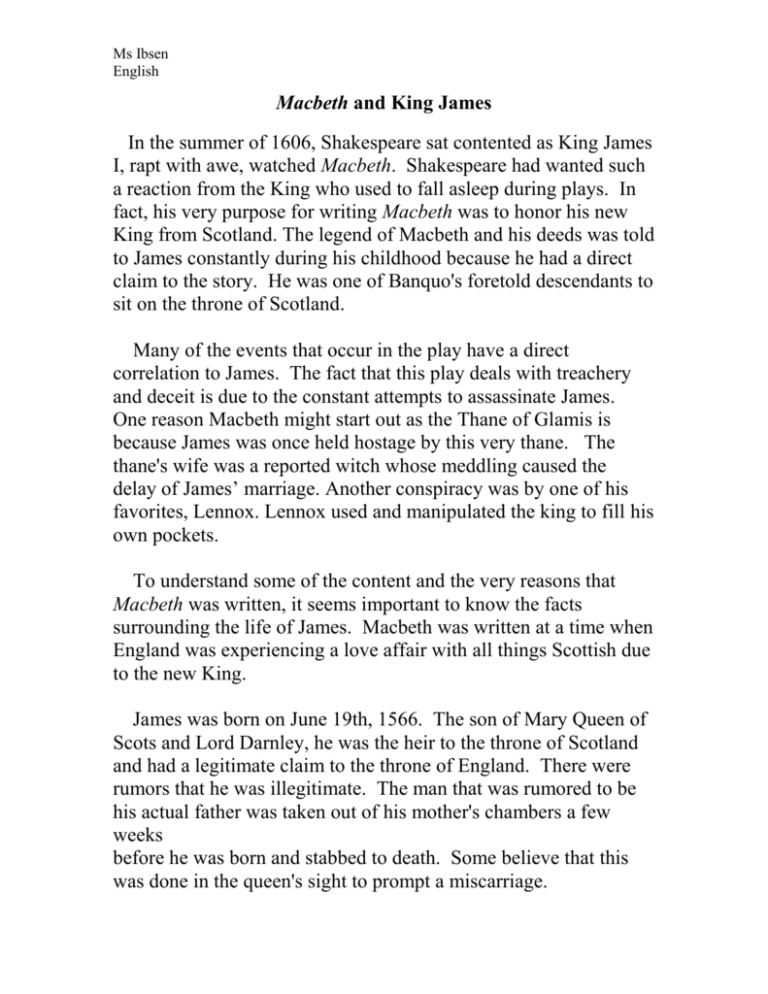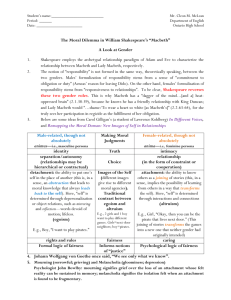Macbeth and King James
advertisement

Ms Ibsen English Macbeth and King James In the summer of 1606, Shakespeare sat contented as King James I, rapt with awe, watched Macbeth. Shakespeare had wanted such a reaction from the King who used to fall asleep during plays. In fact, his very purpose for writing Macbeth was to honor his new King from Scotland. The legend of Macbeth and his deeds was told to James constantly during his childhood because he had a direct claim to the story. He was one of Banquo's foretold descendants to sit on the throne of Scotland. Many of the events that occur in the play have a direct correlation to James. The fact that this play deals with treachery and deceit is due to the constant attempts to assassinate James. One reason Macbeth might start out as the Thane of Glamis is because James was once held hostage by this very thane. The thane's wife was a reported witch whose meddling caused the delay of James’ marriage. Another conspiracy was by one of his favorites, Lennox. Lennox used and manipulated the king to fill his own pockets. To understand some of the content and the very reasons that Macbeth was written, it seems important to know the facts surrounding the life of James. Macbeth was written at a time when England was experiencing a love affair with all things Scottish due to the new King. James was born on June 19th, 1566. The son of Mary Queen of Scots and Lord Darnley, he was the heir to the throne of Scotland and had a legitimate claim to the throne of England. There were rumors that he was illegitimate. The man that was rumored to be his actual father was taken out of his mother's chambers a few weeks before he was born and stabbed to death. Some believe that this was done in the queen's sight to prompt a miscarriage. Ms Ibsen English The queen's husband was murdered by Brothwell, a man who was rumored to be her lover, in early 1567. Fear of an uprising from the people made Mary place James in the custody of the Earl of Mar. Later that year, the queen married Brothwell. She never saw her son again, as she was captured and forced to abdicate. The crown went to James, and he was crowned King of Scotland at thirteen months. He started his education at the age of four. He led a very sheltered childhood. As he grew, he started to express more of his views including his conviction that the king should be an absolute monarch and that he ruled by divine right. He believed that the king should be master of church as well as state. Queen Elizabeth of England. James joined against his mother and with England. He did so on the agreement that his mother would not be killed. Later word that Mary would be executed reached James. He threatened to end the league with Elizabeth and her England if his mother was murdered. Mary was killed any way for being a supposed member of a conspiracy to kill Elizabeth. James did nothing in retaliation. In 1589, he married Anne of Denmark. They married by proxy on August 20th. On her way to meet him in Scotland, Anne's ship went off course due to a horrible storm and then ended up in Oslo. Witches came to him and told him that the devil had made them send the storm. He later wrote a book on witchcraft and how to punish witches. On February 19th, 1594, his first of nine children was born. Prince Henry was supposed to be his heir. As the young Prince grew, the two spent very little time together. He wrote Basilicon Doron, which translated means “the Kingly Gift.” This book was an instruction for the young prince on how to be a good king. Ms Ibsen English In 1603, James became the King of England. As a ruler he initially faced pillaging along the coasts of Scotland by foreign nations. He also had many internal enemies. There were plots to kill him at every turn, the most famous of which was the Gunpowder plot. James was a Protestant. When he was first crowned, the Catholics thought that James would be tolerant because his mother, Mary Queen of Scots, was Catholic. Their expectations were short lived. He once said of the Catholics that he was so far from favoring their superstitious religion that if he thought his son would tolerate it after his death, he would have him buried before his eyes. Due to this saying and others like it the Catholics devised the Gunpowder plot of 1604. A small infamous group that would go down in history was made up of James’ cousin, Thomas Winter, his friend, John Wright, Percy, and the notorious Guy Fawkes, who is still burned in effigy yearly. The plan was to place gunpowder barrels under Parliament House. When the King opened the House on November 5th, the gunpowder would explode. It would kill not only the King, but the Queen, Prince Henry, bishops, and nobles. They began to work in May of 1604 by renting a house next to the Parliament building and digging a tunnel directly under the House of Lords. This proved to be tedious and time consuming. Later they discovered that the house next to theirs had a cellar that ran directly under the Parliament. They bought it and tore the wall that adjoined the two foundations down. Fawkes carried approximately 20 barrels of gun powder into the cellar and was never caught. One conspirator betrayed the plot. The conspirator wrote a letter informing King James of the explosion. The night before the event was to take place there was a search of the property. The King's men found the barrels and tortured the conspirators. Accomplishments of James' reign range from being the founding Ms Ibsen English King of a new world to publishing the Bible. Art and literature thrived under his reign. He became the patron of Shakespeare's troop, which came to be known as the King's Men. He was the founding monarch of the United States. His most well known contribution was the publication of The King James Bible. The king suffered from several physical ailments. His legs were handicapped. His tongue was too large for his mouth. He suffered from arthritis, inability to sleep, and kidney pain, to name a few of his problems. He also suffered from severe depression due to the death of his wife in 1619 and the death of Prince Henry in 1612. All in all, James’ death seemed to be more of a release from troubles than a horrible event. He passed away at the age of 59 on March 27, 1625. He was buried at Westminster Abbey. Unlike many Scottish monarchs, King James died in his bed at peace with his subjects and foreign countries. He also passed Royal power on, intact, to an adult son, which was also unusual. Quic k Ti me™ and a Quick Time™a nd a T IFF (Unc om pres s ed) dec om pres s or TIFF ( Unco mpre ssed ) dec ompr esso r are needed to s ee t his pic t ure. ar e nee ded to see this pictur e. Writing to your Audience Biographic Detail -Scotland -plots How Shakespeare used this to appeal to King James Ms Ibsen English -women -witches -pillaging -religion








